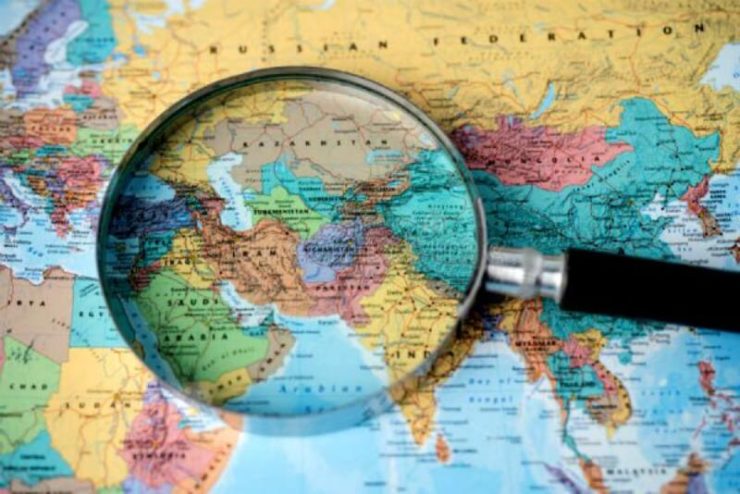
The ongoing military conflict between Russia and Ukraine (and NATO) has brought many changes to the global political order, with many states shifting their alliances in favor of new ones. More recently, the West, i.e., the US and the EU, have begun to renew their engagement with countries in Central Asia and the Caucasus. The belief that because Russia is busy in Ukraine and there is a vacuum in the region, the ongoing regional and global scenario presents an optimal situation for them to exploit. A recent report in the US-government run United States Institute of Peace said that “Central Asian states are looking for a new partner to help ensure their own security against domestic rebellions, as Russia’s war in Ukraine has limited Moscow’s ability to fulfill a longstanding role as a guarantor of domestic stability in the region”. Although the report was written to explain the China-Central Asia Summit, presuming that China and Russia were on a collision course in the region, it is the west itself trying to exploit the situation. As far as China is concerned, its position aligns a lot more neatly with Russia in Central Asia than the West would want us to believe.
In this context, if there is any actor trying to exploit the so-called ‘vacuum’, it is the West. In June 2023, leaders of Central Asian states and the EU President met and made some crucial pronouncements. Believing that Central Asian States are ‘unhappy’ with Russia and believing that all of these states are under threat from Russian ‘aggression’, the meeting concluded with the EU’s ‘unwavering’ commitment to “the principles of respect for the independence, sovereignty, territorial integrity of all countries, non-use of force or threat of its use and peaceful settlement of international disputes”.
The EU’s position matches perfectly with Washington’s. When the US Secretary of State visited Central Asia in February-March, the message he gave explicitly targeted Moscow. To quote Blinken, “If a powerful country is willing to try to erase the borders of a sovereign neighbor [Ukraine] by force, what’s to stop it from doing the same to others [the CAS states]?” Therefore, Blinken confirmed, the US fully supports the Central Asian States’ “sovereignty” and “territorial integrity” [against an aggressive Russia].
The same message was reiterated when Biden met CAS leaders on the sidelines of the UN summit. Calling it a “historic moment”, Biden went on to reinforce that the meeting “is grounded in our shared commitment to sovereignty, independence, territorial integrity”. He discussed counterterrorism, regional economic connectivity and connecting CAS’ private sector with the US’, and the potential for initiating a new “minerals dialogue to strengthen the West’s energy security and supply chains for years to come”.
Regardless of whether there is a ‘vacuum’ ready to be exploited or not and regardless of whether the Central Asian States think that they are under actual threat from Russia, the West’s strategic interest remains to minimize the Russian influence as part of its push to kill its competition. In the long run, the push to minimize Russian influence could also produce fresh geopolitics of NATO’s expansion to include states from Central Asia, such as Azerbaijan.
Azerbaijan happens to be very closely allied with Turkey, a NATO member. At present, Azerbaijan is a key source of gas supplies to the EU, and it has declared Azerbaijan to be its “critical partner”. Therefore, plans are already being made to double Azerbaijan’s gas supplies to Europe to 20 billion cubic meters a year. More importantly, this supply happens via the TANAP pipeline, which carries Azeri gas across Turkey to Greece. Concurrent plans are also being made to expand the pipeline to its full 31 billion cubic meters a year capacity for the full flow of gas to take place smoothly.
Armenia is another target. Although Armenia’s security is tied with Russia, the country has, in recent years, began to shift to a more pro-West position. Earlier this year in June, the EU-Armenia Partnership Committee, established in 2017 under the EU-Armenia Comprehensive and Enhanced Partnership Agreement (CEPA), met for the fourth time in Brussels. CEPA is an instrument that the EU is using to transform Armenia in its own image with a geopolitical purpose. For example, one of the key purposes of the agreement is to “diversify” Armenia’s economy. At present, Russia outweighs the EU in its bi-lateral trade with Armenia. In 2022, Russia-Armenia bilateral trade stood at US$ 5.3 billion. In 2023, Armenia-EU trade stood at less than US$ 2 billion. In this context, the emphasis on diversifying Armenia’s trade means reducing Armenia’s trade ties with Russia and increasing the same with the EU. The underlying idea is to use trade to wean countries in the Caucasus and Central Asia away from Russian influence.
This was made unequivocally clear by the German Foreign Minister’s visit to Kazakhstan in October 2022. The Minister said that “it is important to me that the future [of Central Asian States] holds more for them than merely the choice between being straitjacketed in Russia’s front yard or being dependent on China. And so my main aim in Kazakhstan and Uzbekistan is to listen to the hopes and expectations that people there are pinning on Europe in the current circumstances”.
The plan to encircle Russia is, therefore, is in full motion in the West. Whether it can succeed or not is difficult to say. For one thing, whereas Russia continues to have a very large security – and economic – presence across Central Asia and the Caucasus, China’s presence is yet another formidable challenge for the West to overcome, which requires the West to replace the peanuts, it has offered to the region with major economic programmes. So far, there is none.
Salman Rafi Sheikh, research-analyst of International Relations and Pakistan’s foreign and domestic affairs, exclusively for the online magazine “New Eastern Outlook”.
